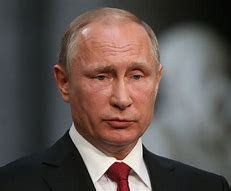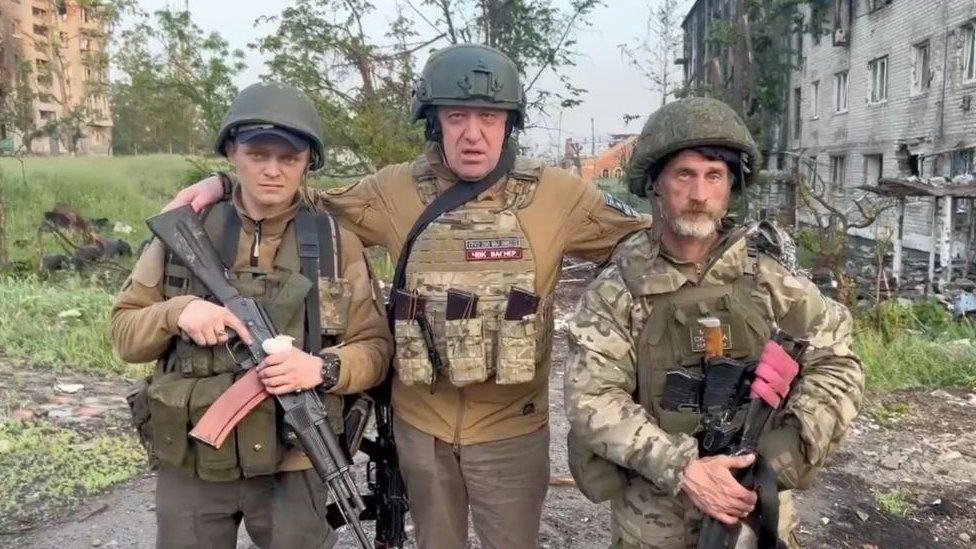BBC News 24 June 2023
This is a defining moment in Russia's 16-month full-scale war in Ukraine and potentially a challenge to Vladimir Putin's grip on power.
The Russian leader has accused Wagner mercenary boss Yevgeny Prigozhin of betraying Russia with an armed rebellion - "a stab in the back of our country".
What's going on?
For months Prigozhin has played a vital role in Russia's military campaign in Ukraine, recruiting thousands to his Wagner mercenary group, especially from Russian jails.
He has long been in an open feud with the military chiefs running the war, but that has now turned into a revolt.
Wagner forces have crossed from occupied eastern Ukraine into the big southern Russian city of Rostov-on-Don, and claim to have taken control of its military facilities.
President Putin says the situation is difficult but has promised to do everything to defend Russia.
Is this a coup?
All claims of a military coup are absurd, claims Prigozhin.
But what began as a no-holds-barred row over the military's failure to supply his mercenaries with sufficient kit and ammunition has now spilled over into a direct challenge to the two men in charge of prosecuting the war - Defence Minister Sergei Shoigu and armed forces chief Valery Gerasimov.
So far this is not a coup, as there has been no bid to seize power from the government. But it is an attempt to topple Russia's top military men and therefore a challenge to the president's authority.
"There are 25,000 of us," he claimed. "Everyone who wants, join us." That is not enough to threaten the president but it is a challenge to the military leadership.
Moving his forces across the border into Rostov, he appears to have surrounded the military HQ from where the war is being run, and claims both the minister and chief of staff have fled.
How this developed
Prigozhin has long been a close ally of President Putin and has flourished under him, first as a wealthy businessman and then as a mercenary chief.
His Wagner fighters have died in big numbers in the bitter campaign to seize Bakhmut in eastern Ukraine, which lasted months and was never fully achieved. Prigozhin blamed the military top brass for shell shortages, with graphic videos and expletive-ridden social media rants exposing the failings and the fractures of Russia's military in Ukraine.
He never directly targeted his anger at the president, but his sarcastic references to "happy grandfather" were widely seen as indirect criticism. Last month he asked how Russia could win if it turned out that "this grandfather is a complete arsehole".
Then, in a lengthy tirade on 23 June he told Russians that the whole justification for their war was a lie and merely an excuse for "a small group of scumbags" to promote themselves and deceive the public and president.
Events have moved very quickly since then.
Prigozhin accused the military of staging a deadly shelling on his men in Ukraine, but the military denied it and he failed to produce the kind of evidence he often does.
Late on Friday he announced his "march for justice" was under way. His force of 25,000 would be just a "tactical reserve" and the whole of the army and the whole country would be their strategic reserve.
Gen Sergei Surovikin, deputy commander of forces in Ukraine, appealed to him to step back and submit to President Putin's authority.
But by morning Prigozhin's men had reached Rostov: "We are inside [military] headquarters."
A serious moment for Putin and Russia
This is not a direct challenge to Russia's war in Ukraine or the president's leadership. But it is sufficiently serious for the Russian leader to give a determined and uncompromising five-minute televised address.
Prigozhin has threatened not just to set up camp in Rostov, but to head towards Moscow if his military demands are not met.
Until now he has only battled the military leadership for increased weapons supplies, now he is taking on the leadership itself.
Prigozhin has substantial public support in Russia and, even if his challenge does fall apart, this is at the very least a moment of crisis for a military that has relied on his mercenaries in Ukraine.
But this is also a defining moment for the Putin leadership and a wake-up call for Russians. It is too soon to say how it will end.

